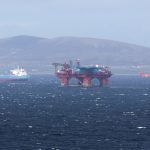

OIC unveils £230m harbour investment plan

An ambitious £230million harbours infrastructure masterplan will place Orkney at the forefront of the drive for a cleaner, greener future, and create as many as 115 jobs.
That is the message from Orkney Islands Council (OIC) today, Thursday, after Orkney Harbours officially launched their vision for the future.
Phase one of the Orkney Harbours Masterplan considers five main locations, and focuses on enhancements over a 20-year period.
However, looking closer at the detail, questions remain unanswered over the funding of such major developments, and how far into the future these projects could be in the making.
Current investment estimates will see £115.7m being spent on the Scapa Deep Water Quay, £52.8m on Hatston Pier, £39.9m on Kirkwall Pier, £15.2m on Scapa Pier, and £800,000 at Stromness.
The project represents the first step in a review of Orkney Harbour Authority-owned infrastructure to create a base for innovation, and secure the long-term future for the community.
The infrastructure proposals have been designed to enable Orkney to manage a transition away from fossil fuels, while continuing to generate social and economic benefit from ongoing oil and gas activity.
The proposals will have “transformational” impact on Orkney’s economy and society. As well as creating as many 115 new jobs, there will also be a substantial number of job opportunities during the construction phase.
OIC leader James Stockan said: “Our vision is to build a truly sustainable business that is a core economic asset for Orkney, but also a first phase in enabling a scale of investment and logistical capability for the UK, which will be of international significance.
“Prime Minister Boris Johnson clearly welcomed our ambition and Orkney’s potential during his recent visit to our islands, describing as a ‘fantastic idea’ our vision for Orkney as a low-carbon, zero-emissions hub of innovation, with Scapa Flow at its heart.
“We believe the time is right to maximise the incredible natural assets and geography of Scapa Flow and Orkney, to ensure a long-term sustainable future for our communities. We are open for business now, and ready to work with potential investors and operators to develop the significant strategic and international opportunities Scapa Flow offers.
“The Scapa Deep Water Quay proposal has been included in the Islands Deal list of projects that has received funding commitment from the Scottish and UK governments, and we are continuing to ensure that the funding earmarked for this will be secured.”
Central to the project is the unique geographical advantage of Scapa Flow, described by the council as the largest natural deep-water harbour in the northern hemisphere, as the potential setting for internationally significant marine logistics to serve the new and emerging sectors, including low-carbon fuel transition and offshore wind developments.
Scapa Deep Water Quay is seen as the optimal location for construction and operations and maintenance activities, associated with offshore wind, as well as for a liquefied natural gas (LNG) storage and distribution hub. At the same time, this infrastructure has the capability to accommodate semi-submersible platforms of all types, giving Orkney a unique UK competitive edge within the existing oil and gas market.
The project team believes it could be delivered by 2025. Other proposals, such as Hatston and Kirkwall, could take three or four years to deliver.
Phase two will ultimately develop the islands’ smaller harbours and piers across the islands.
Harbour users and key stakeholders were consulted from the outset, to help gain an understanding of the issues, constraints and opportunities associated with harbour infrastructure around Orkney, through workshops and interviews.
The range of stakeholders includes local communities, harbour users, potential funders and environmental bodies such as Scottish Natural Heritage.
Harbourmaster James Buck added: “Tackling decarbonisation is the strand that binds these proposals together, providing infrastructure and knowledge for renewable energy developments around our waters will allow us to reach climate change targets.
“We will also look at the potential for net environmental gain through habitat reinstatement and enhancement.”
According to the OIC, Orkney Harbours is one of the most diverse and successful council-run port authorities in the UK, with an annual turnover of £25 million and nearly 31,000 annual vessel movements.
The council added that the exact timing of construction for each of the phase one masterplan proposals is not yet known.
This will be determined over the next six to 12 months, and will depend on a range of factors including market requirements, funding and environmental considerations.